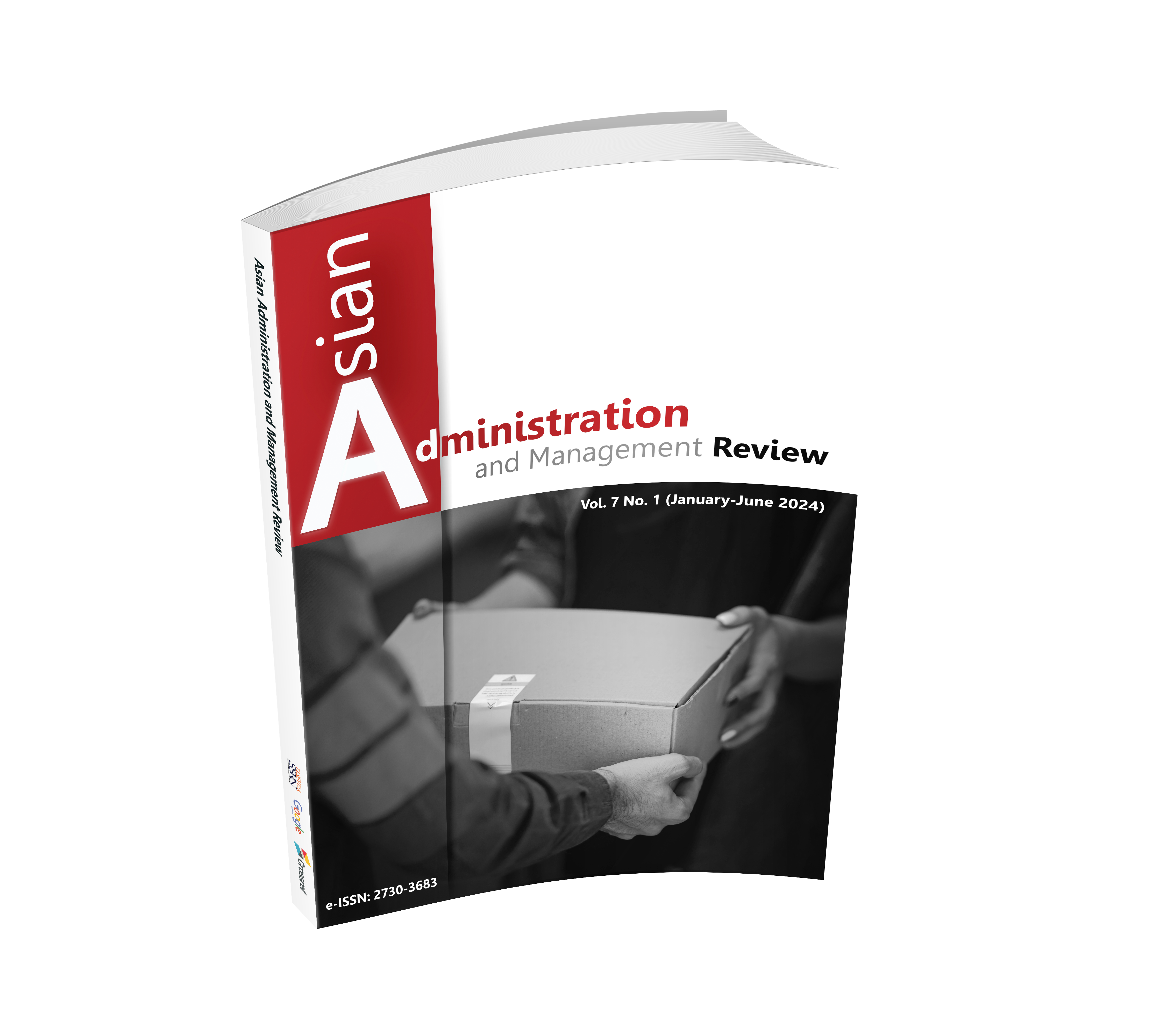ENTREPRENEURS’ CHARACTERISTICS THAT IMPACT SUCCESS IN ORGANIC FARMING
DOI:
https://doi.org/10.14456/aamr.2024.2Keywords:
Entrepreneurs, Characteristics, Organic Farming, FarmerAbstract
The purpose of this research is to study the characteristics of entrepreneurs that affect their success in being smart farmers and the guidelines for developing them into agricultural entrepreneurs. In this research, qualitative methods were used with in-depth structured interviews and document studies. The research results found that 5 characteristics of entrepreneurs are: 1) Honesty. 2) Have basic knowledge and experience in the business that they do. 3) Stability, consistency and passion for learning. 4) Achievement motivation. 5) Learning from past experiences Developing farmers to become agricultural entrepreneurs involves (1) farmers being able to change their way of thinking from “doing more, getting less” to “doing less, getting more” (2) changing traditional agriculture to modern, and (3) emphasizing the use of Smart and Precision systems. Farming using ICT systems for creativity. For innovation in research and development, farmers must join the farmer network to strengthen their agricultural business and develop production to produce agricultural products that are certified for export. In addition, the development guidelines will help farmers have more income and a better quality of life for sustainable self-reliance. To promote ASEAN cooperation, there should be an agreement to promote trade, investment, and labor potential. and agricultural research for development. To find ways to coordinate international cooperation for sustainable development and upgrading of agriculture in Southeast Asia, the government must also support small entrepreneurs in their investment efforts and promote connectivity between the North-South Economic Corridor project and the East-West Economic Corridor.
Downloads
References
Breevaart, K., & de Vries, R. (2021). Followers’ HEXACO personality traits and preference for charismatic, relationship-oriented, and task-oriented leadership. Journal of Business and Psychology, 36(2), 253-265.
Gu, Q. (2011). Leaders Who Build and Sustain Passion for Learning: Capacity Building in Practice. In T. Townsend., & J. MacBeath. (eds.). International Handbook of Leadership for Learning (pp. 991-1009). South Holland: Springer Netherlands.
Kahan, D. (2012). Why we are poles apart on climate change. Nature, 488, 255.
Kim, H. (2005). Organizational structure and internal communication as antecedents of employee-organizational relationships in the context of organizational justice: A multilevel analysis. Doctor of Philosophy Thesis, University of Maryland.
Lans, T., Verstegen, J., & Mulder, M. (2011). Analysing, pursuing and networking: Towards a validated three-factor framework for entrepreneurial competence from a small firm perspective. International Small Business Journal, 29(6), 695-713.
Lans, T., Seuneke, P., & Klerkx, L. (2013). Agricultural Entrepreneurship. In E. Carayannis. (ed.). Encyclopedia of Creativity, Invention, Innovation and Entrepreneurship (pp. 44-49). New York: Springer.
Lauring, J., & Klitmøller, A. (2015). Corporate language-based communication avoidance in MNCs: A multi-sited ethnography approach. Journal of World Business, 50(1), 46-55.
Lønsmann, D. (2017). Embrace it or resist it? Employees’ reception of corporate language policies. International Journal of Cross Cultural Management, 17(1), 101-123.
Marschan-Piekkari, R., Welch, D., & Welch, L. (1999). In the shadow: the impact of language on structure, power and communication in the multinational. International Business Review, 8(4), 421-440.
Office of the Education Council. (2015). Subject Research Analysis of Thai Education in the 21st Century World. Bangkok: Office of the Education Council.
Office of the Education Council. (2018). Status of Thai Education in 2017/2018. Guidelines for Reforming Thai Education to move Towards Thailand 4.0. Bangkok: Office of the Education Council.
Pattweekongka, S. (2022). Organic Food Brand Trust and Brand Loyalty: Evidence from Thailand. AgBioForum, 24(1), 129-133.
Peltokorpi, V., & Yamao, S. (2017). Corporate language proficiency in reverse knowledge transfer: A moderated mediation model of shared vision and communication frequency. Journal of World Business, 52(3), 404-416.
Peltokorpi, V., & Zhang, L. (2022). Host country culture and language identification, and their workplace manifestations: A study on corporate expatriates in China and Japan. Journal of International Management, 28(3), 100926.
Raktaengam, S., & Jessadalak, W. (2017). The Influence of Investors' Entrepreneurial Characteristics on Investment Success through the Focus on Competition among Retail Investors within the Stock Exchange of Thailand. SriNakharinwirot Business Administration Journal, 8(2), 96-109.
Sakdapat, N. (2022). Analysis of the Path of influence of work skills in the new normal life of the undergraduate students in Thailand. Social Space, 22(3), 152-168.
Sanden, G. (2016). Language: the sharpest tool in the business strategy toolbox. Corporate Communications: An International Journal, 21(3), 274-288.
Shelman, M., & Connolly, A. (2012). The Human Capital Issue: Ensuring the Future of Food and Agribusiness. International Food and Agribusiness Management Review, 15(Special Issue A), 1-2.
Sompong, C., & Phueakbuakhaol, S. (2020). Model for Developing Competency of Community Enterprise Entrepreneurs in Prachuap Khiri Khan Province. Academic Journal Phranakhon Rajabhat University, 11(1), 310-327.
Verhees, F., Lans, T., & Verstegen, J. (2012). The influence of market and entrepreneurial orientation on strategic marketing choices: the cases of Dutch farmers and horticultural growers. Journal on Chain and Network Science, 12(2), 167-179.
Weinzierl, L. (2023). Bridging the boundaries of corporate language competence in multinational teams. Retrieved from https://research.stmarys.ac.uk/id/eprint/6139.

Downloads
Published
How to Cite
Issue
Section
License
Copyright (c) 2023 Authors

This work is licensed under a Creative Commons Attribution-NonCommercial-NoDerivatives 4.0 International License.











.png)


